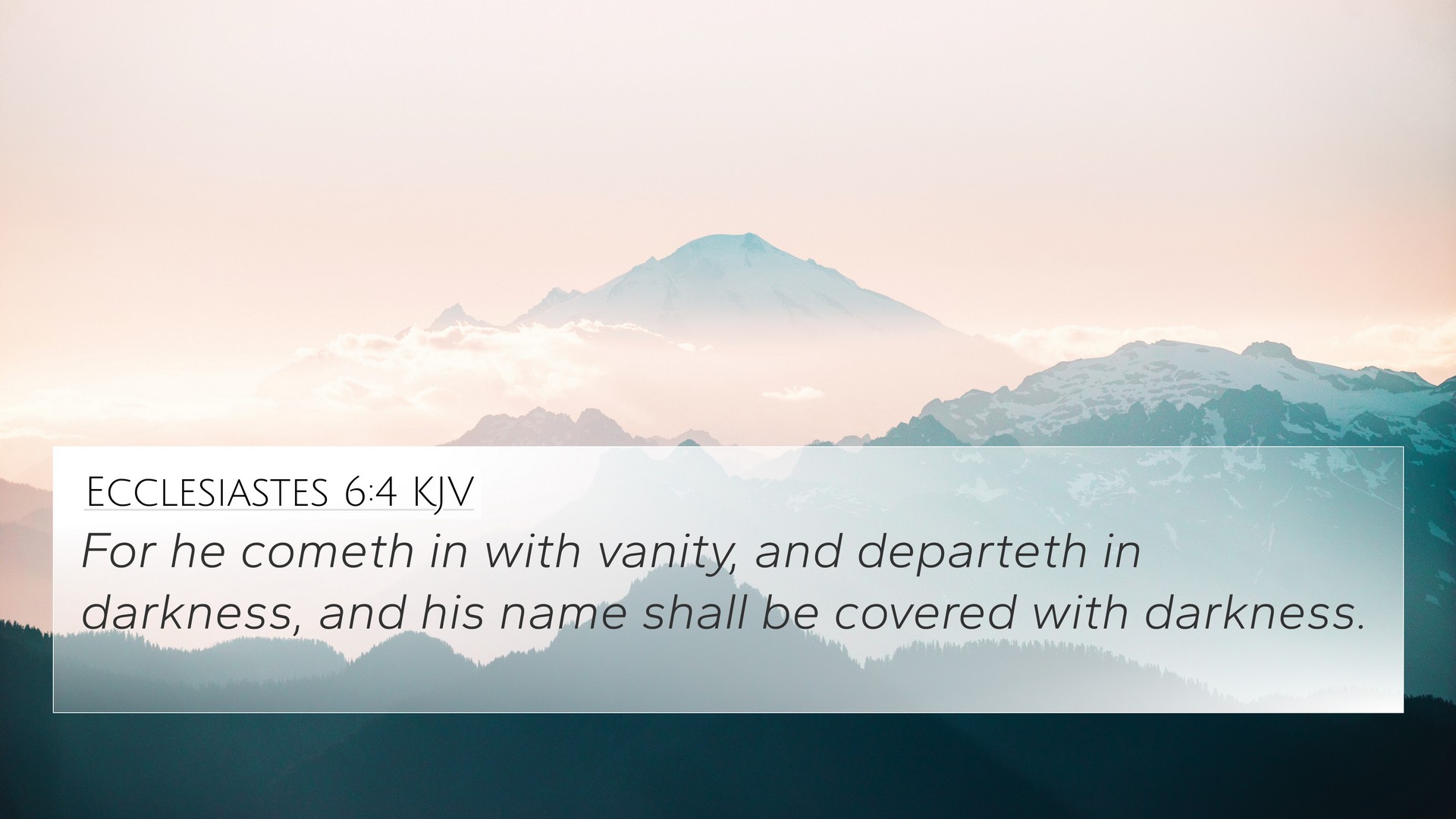Old Testament
Genesis Exodus Leviticus Numbers Deuteronomy Joshua Judges Ruth 1 Samuel 2 Samuel 1 Kings 2 Kings 1 Chronicles 2 Chronicles Ezra Nehemiah Esther Job Psalms Proverbs Ecclesiastes Song of Solomon Isaiah Jeremiah Lamentations Ezekiel Daniel Hosea Joel Amos Obadiah Jonah Micah Nahum Habakkuk Zephaniah Haggai Zechariah MalachiEcclesiastes 6:4 Similar Verses
Ecclesiastes 6:4 Cross References
For he cometh in with vanity, and departeth in darkness, and his name shall be covered with darkness.
Uncover the Rich Themes and Topics of This Bible Verse
Listed below are the Bible themes associated with Ecclesiastes 6:4. We invite you to explore each theme to gain deeper insights into the Scriptures.
Ecclesiastes 6:4 Cross Reference Verses
This section features a detailed cross-reference designed to enrich your understanding of the Scriptures. Below, you will find carefully selected verses that echo the themes and teachings related to Ecclesiastes 6:4 KJV. Click on any image to explore detailed analyses of related Bible verses and uncover deeper theological insights.

Psalms 109:13 (KJV) »
Let his posterity be cut off; and in the generation following let their name be blotted out.
Ecclesiastes 6:4 Verse Analysis and Similar Verses
Understanding Ecclesiastes 6:4
Ecclesiastes 6:4 states, "For he comes in vanity, and departs in darkness, and his name shall be covered with darkness." This verse provides profound insight into the fleeting nature of life and the ultimate futility of human endeavors when disconnected from God's purpose. The following analysis draws from esteemed public domain commentaries, such as Matthew Henry, Albert Barnes, and Adam Clarke, to elucidate the meaning of this scripture.
Verse Context and Overview
The Book of Ecclesiastes is traditionally attributed to King Solomon, who reflects on the meaning of life and the worth of human efforts. In this chapter, he examines the concept of vanity and the essence of human existence.
Key Insights from Commentaries
Matthew Henry's Commentary
Henry emphasizes that this verse illustrates the fundamental reality that human life can often seem meaningless when viewed in isolation from God. He notes that the mention of a life "coming in vanity" encapsulates the idea that birth and existence may not necessarily yield lasting joy or fulfillment without divine connection.
Albert Barnes' Notes
Barnes points out the metaphorical use of "darkness" to signify ignorance and separation from true meaning. He elaborates that a life led in darkness, characterized by vanity, ultimately results in no lasting legacy or remembrance, as indicated by the phrase "his name shall be covered with darkness."
Adam Clarke's Commentary
Clarke highlights the despair of living a life devoid of purpose. He notes that the verse underscores the inevitability of death, raising questions about what remains once the brief light of life is extinguished. Clarke suggests that this leads to a sense of urgency for individuals to seek a more profound meaning in their existence.
Cross-References for Ecclesiastes 6:4
To further understand Ecclesiastes 6:4, we can explore several related verses through cross-referencing Biblical texts. Here are the key connections:
- Psalm 39:6-7 - Highlights the transitory nature of life.
- Proverbs 10:7 - Discusses the distinction between the names of the righteous and the wicked.
- Isaiah 40:6-8 - Affirms the temporary nature of human life, likening it to grass.
- James 4:14 - Reminds us that life is a vapor, which appears for a little time.
- Hebrews 9:27 - Addresses the certainty of death and divine judgment.
- Ecclesiastes 1:2 - Opens the book with the proclamation of the vanity of life.
- Job 14:1-2 - Delivers the sobering truth about human frailty and mortality.
- Psalm 49:10-12 - Expounds on the foolishness of trusting in riches and human endeavors.
Thematic Links and Connections
Ecclesiastes 6:4 highlights broader themes that echo throughout Scripture. The notions of vanity and darkness can be deeply explored through:
- **The futility of earthly pursuits** - such as seen in Matthew 16:26, where Jesus posits the cost of gaining the world over one's soul.
- **The pursuit of wisdom** - found in Proverbs 3:13-18, contrasting human folly with divine wisdom.
- **The reality of death** - discussed in Ecclesiastes 3:20, which states all return to dust, emphasizing life's ephemeral nature.
Interpretative Reflections
In interpreting Ecclesiastes 6:4, we are encouraged to consider the cross-referenced themes that illuminate God's design for humanity. Seeking wisdom, embracing divine guidance, and recognizing our ultimate destiny can shift our understanding from vanity to purpose. Cross-referencing Biblical texts opens a comprehensive view of life, death, and the quest for meaning, making it an essential tool for deeper theological reflection and study.
Conclusion
Ecclesiastes 6:4 speaks volumes about the transient nature of life and the importance of seeking a higher purpose beyond material endeavors. By utilizing tools for Bible cross-referencing, readers can identify the rich connections between scripture and discover a unified message throughout the Biblical narrative.


